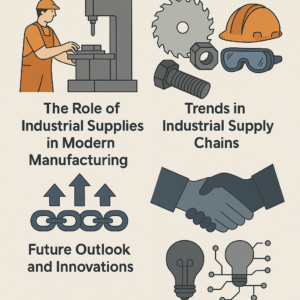Key Takeaways:
- Industrial supplies are essential for the smooth operation of manufacturing and mill-based businesses.
- Understanding the different types of industrial supplies can enhance efficiency and safety in operations.
- Staying updated with industry trends ensures firms remain competitive and innovative.

The Role of Industrial Supplies in Modern Manufacturing
Industrial supplies are the heartbeat of manufacturing and mill operations, providing the essential materials and tools required to maintain high productivity levels. These supplies encompass various items, from critical components to cutting-edge machines, each playing a pivotal role in ensuring manufacturing processes run smoothly. The provision of these supplies is crucial as they significantly impact operational efficiency and workplace safety.
Companies, such as Cruco Mill & Industrial Supply offer access to a formidable variety of materials and tools necessary for optimal performance. Whether it be precision cutting tools or the latest safety equipment, these supplies empower a manufacturing entity to keep downtime to a minimum, enhance operational workflow, and, ultimately, increase profitability. Emphasizing the importance of these supplies is not merely about maintaining current operations but also about future-proofing the business against unforeseen challenges.
Types of Mill and Industrial Supplies
The world of industrial supplies is vast and encompasses many products designed to meet diverse industrial needs. Among the most commonly utilized supplies are cutting tools, safety equipment, fasteners, and bearings, each of which serves a unique function essential for various applications in mills.
Common Supplies
- Cutting Tools: Crucial for shaping and modifying materials, they range from saws to precision drills, aiding in creating products to exact specifications.
- Fasteners: These include screws, bolts, and nuts, necessary for holding components together and ensuring the stability and structural integrity required in heavy-duty machinery.
- Safety Gear: Workers’ protection is paramount, and safety equipment such as helmets, gloves, and eye protection reduces the risk of injury, thus fostering a safer working environment.
When choosing industrial supplies, quality control is still of the utmost importance because the dependability of these goods may significantly impact operational results. A trustworthy source may make all the difference in guaranteeing that these items satisfy the exacting requirements of contemporary industrial settings.
Trends in Industrial Supply Chains
The industrial landscape is transforming, with supply chains adapting to new technologies and innovations. Automation, in particular, has introduced a dynamic element to supply management, enabling companies to streamline operations, reduce inefficiencies, and manage inventory with unprecedented accuracy.
Additionally, there is a discernible trend toward ecologically friendly items. Businesses nowadays choose providers that can offer eco-friendly solutions since they are more conscious of their environmental impact. As a result of consumer and governmental pressures, the industrial sector is progressively embracing sustainability.
Key Considerations for Choosing a Supplier
When selecting a supplier for industrial supplies, businesses must consider several crucial factors. Reliability, quality, and cost are at the forefront of this decision-making process. However, beyond these parameters, the significance of customer service and after-sales support is increasingly being recognized.
Suppliers who excel in delivering excellent customer service, responsive communication, and reliable support are essential partners in any business environment. Manufacturers collaborating with proactive and supportive suppliers are better positioned to address operational challenges and foster innovation.
Future Outlook and Innovations
The industrial supplies sector is poised for significant growth and transformation. Cutting-edge technology, including artificial intelligence and advanced data analytics, is expected to shape the fabric of future operations. These advancements will drive efficiency, accuracy, and innovation in the production processes.
The upcoming market presents many possibilities for expansion as companies continue to pour resources into groundbreaking solutions. As the industry progresses, suppliers and clients need to adjust to these technological developments to stay competitive.
